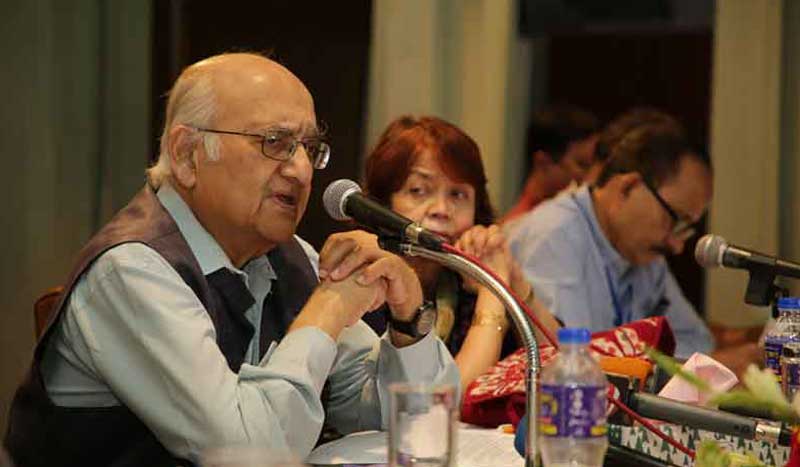Published in Dhaka Tribune on Friday 21 June 2019

Ethnic groups vulnerable in isolation, political representation underscored
Centre for Policy Dialogue Chairman has said marginalized communities must be empowered to solve social problems.
He was speaking as the chief guest at the 2-day National Conference and Cultural Festival on Inequality, Separation and Rights of Ethnic Communities and Marginalized People at the LGRD Auditorium at Agargaon in Dhaka on Thursday.
More than 300 people from 50 ethnic groups and communities, including Vedas, Harijans, Kayaputra, people from tea plantation communities, Bihari and Rishis, participated in the conference.
The conference styled as “No one left behind” was designed to highlight the plight of the disenfranchised sections of the society.
Prof Rehman Sobhan said: “Sometimes we notice incidents of protest-demonstration for fair wages in tea gardens.” The lands of Garos are illegally occupied. Apparently, it was those who have money and political muscle are believed to have been involved in such repression, exploitation and occupation.
In order to solve these social problems, marginalized communities must be empowered besides being represented through political participations.
Neighboring India does have such political parties to represent those small ethnic communities.
In this way, poorer ethnic sub-groups would become more visible in our country, he added.
He also said protection of their traditional land-rights is also needed. A legal framework is necessary in this regard.
Annual budget of Bangladesh must articulate their rights; otherwise, it will not be possible to implement the vision of Bangabandhu’s covenant of our independence.
The inaugural session was presided over by former Adviser of the care taker government and the Executive Director of PPRC Dr Hossain Zillur Rahman.
He said: “The purpose of today’s conference is to share and highlight the problems of the marginalized people to the top level government officials and policy makers.
The marginalized communities have to work together, thereby avoid isolation.
The marginalized people will have to find strength and courage in order to empower themselves. They will have to come out from dark and become more and more visible.
He also said: “There are discrepancies in our development priorities. So there is perpetual confusion in our development activities. The government will have to find an ideal reconciliation among development priorities.
As the key note speakers, the Society for Environment and Human Development (SEHD) Director Philippe Gain said: “There are people of many ethnic identities in the country in addition to the majority of Bengalis in Bangladesh.
The government has recognized 50 ethnic groups from the previous 24. The government must underscore the importance of recognizing ethnic groups and their diversity.
He said: “These marginalized people should have accurate statistics. But officially, our country’s initiative is insufficient. We surveyed 44 villages of Madhupur. At that time where everyone was garo and coch, now 65 percent of the Bengali people have been reported. In these villages, 11% of Bengalis have ownership documents and Garos has only 4%. Vast majority of people in Madhupur are terrified with cases over forest. There are even 100 odd cases being filed against one individual.”
Some people were shot dead during the movement. Some have sustained grievous injuries including paralysis. The problem of this region must be solved. We must make determined effort on how we could establish rights and protection of these people.
80 percent quota has been declared for the Harijan community from the prime Minister’s office. But in reality it was not implemented either.
Maternal mortality rate in tea garden area is one of the highest in the country.
Literary Harishankar Zaldas, General Secretary of Bangladesh Tea Workers Union and Vice Chairman of Kamalganj Upazila Parishad Rammhon Kairi, CPB Honorable Fellow Professor Ronak, Executive Director of CCBB Jayant Adhikari, European Union representative Arde Malyat, among others spoke on the occasion.
The chief guest unveiled a book; ‘Madhupur: The Vanishing Forest and Her People in Agony’
The 2-day National Conference and Cultural Festival ends on Friday following several parallel discussions and cultural events culminating with a Dhaka declaration.


